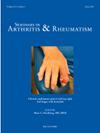Renal outcomes and survival in amyloidosis associated with familial Mediterranean fever: A longitudinal study
IF 4.6
2区 医学
Q1 RHEUMATOLOGY
引用次数: 0
Abstract
Objectives
Long-term outcomes of Familial Mediterranean fever (FMF)-associated amyloidosis (FMF-amyloidosis) have been rarely evaluated. This study aimed to investigate renal and overall survival in patients with FMF-amyloidosis and define the factors affecting outcomes.
Methods
We retrospectively analyzed patients with FMF-amyloidosis treated between 2000 and 2022. The primary outcome was the rate of end-stage renal disease or death during the study period. Patients not achieving this outcome served as references to identify factors affecting the outcome.
Results
The study included 61 patients with FMF-amyloidosis, of whom 82% attained the primary outcome within a mean of 10.8 ± 9.6 years from the diagnosis of amyloid nephropathy. Lower estimated glomerular filtration rate (eGFR) and increased concomitant medication usage at the time of amyloidosis diagnosis were significant outcome determinants. Maximally selected rank statistics followed by survival analysis determined that an optimal eGFR cutoff <67 mL/min/1.73 m2 at amyloidosis diagnosis was significantly associated with a shorter time to endpoint, with a 10-year kidney or overall survival of 17% versus 59% below or above this cutoff, respectively. Kaplan–Meier analysis revealed that treatment with interleukin-1 (IL-1) blockers, administered to 13 timely relevant patients, had no impact on outcomes.
Conclusions
FMF-amyloidosis generally has poor long-term prognosis, significantly influenced by the amyloid burden at diagnosis. IL-1 blocker efficacy in altering these outcomes remains uncertain owing to the small sample size.

求助全文
约1分钟内获得全文
求助全文
来源期刊
CiteScore
9.20
自引率
4.00%
发文量
176
审稿时长
46 days
期刊介绍:
Seminars in Arthritis and Rheumatism provides access to the highest-quality clinical, therapeutic and translational research about arthritis, rheumatology and musculoskeletal disorders that affect the joints and connective tissue. Each bimonthly issue includes articles giving you the latest diagnostic criteria, consensus statements, systematic reviews and meta-analyses as well as clinical and translational research studies. Read this journal for the latest groundbreaking research and to gain insights from scientists and clinicians on the management and treatment of musculoskeletal and autoimmune rheumatologic diseases. The journal is of interest to rheumatologists, orthopedic surgeons, internal medicine physicians, immunologists and specialists in bone and mineral metabolism.

 求助内容:
求助内容: 应助结果提醒方式:
应助结果提醒方式:


